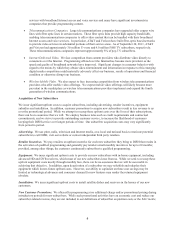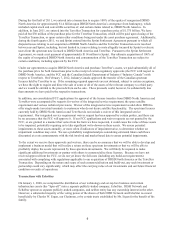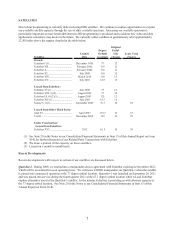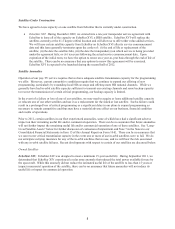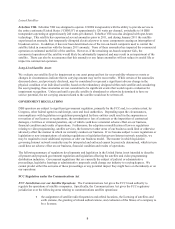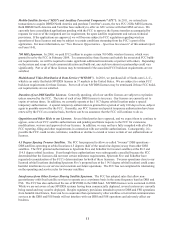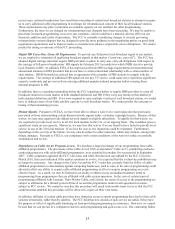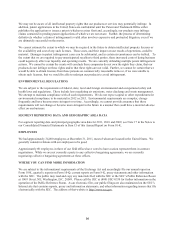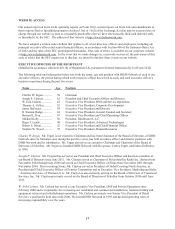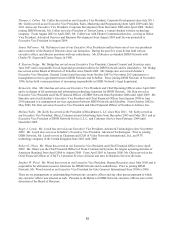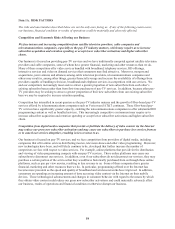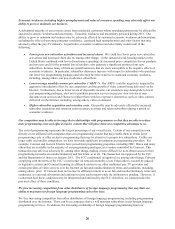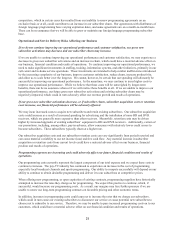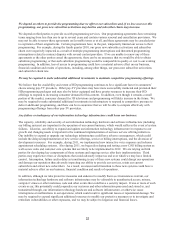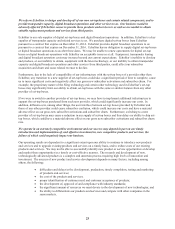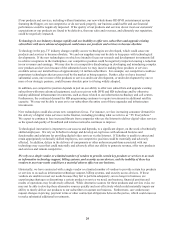Dish Network 2011 Annual Report Download - page 24
Download and view the complete annual report
Please find page 24 of the 2011 Dish Network annual report below. You can navigate through the pages in the report by either clicking on the pages listed below, or by using the keyword search tool below to find specific information within the annual report.14
14
to access such programming could materially and adversely affect our ability to compete in regions serviced by
these cable providers.
MDU Exclusivity. The FCC has found that cable companies should not be permitted to have exclusive relationships
with multiple dwelling units (e.g., apartment buildings). In May 2009, the D.C. Circuit upheld the FCC’s decision.
While the FCC requested comments in November 2007 on whether DBS and Private Cable Operators should be
prohibited from having similar relationships with multiple dwelling units, it has yet to make a formal decision. If
the cable exclusivity ban were to be extended to DBS providers, our ability to serve these types of buildings and
communities would be adversely affected. We cannot predict the timing or outcome of the FCC’s consideration of
this proposal.
Net Neutrality. The FCC has recently imposed rules of nondiscrimination and transparency upon wireline
broadband providers. While this decision provides certain protection from discrimination by wireline broadband
providers against our distribution of video content via the Internet, it may still permit wireline broadband providers
to provide certain services over their wireline broadband network that are not subject to these requirements.
Although the FCC imposed similar transparency requirements on wireless broadband providers, it declined to
impose a nondiscrimination rule. Instead, wireless broadband Internet providers are prohibited from blocking
websites and applications that compete with voice and video telephony services. The FCC’s net neutrality rules
have been challenged in Federal court and could be curtailed or overturned if those challenges are successful. One
party has asked the FCC to clarify and/or ease the limitations under which wireline broadband providers can provide
services that are not subject to these requirements. It is uncertain how these requirements, even if they are affirmed
by the Federal court of appeals, may be interpreted and enforced by the FCC; therefore, we cannot predict the
practical effect of these rules on our ability to distribute our video content via the Internet.
Comcast/NBC Universal Transaction. Comcast and General Electric have joined their programming properties,
including NBC, Bravo and many others, in a venture to be controlled by Comcast. In January 2011, the transaction
was approved by the FCC and the Department of Justice. The FCC conditioned its approval on, among other things,
Comcast complying with the terms of the FCC’s recent order on network neutrality (even if that order is vacated by
judicial or legislative action) and Comcast licensing its affiliated content to us, other traditional pay-TV providers
and certain providers of video services over the Internet on fair and nondiscriminatory terms and conditions,
including, among others, price. If Comcast does not license its affiliated content to us on fair and nondiscriminatory
terms and conditions, we can seek arbitration and continue to carry such content while the arbitration is pending.
However, it is uncertain how these conditions may be interpreted and enforced by the FCC; therefore, we cannot
predict the practical effect of these conditions.
Spectrum Investment FCC Authorization
During the first half of 2011, we entered into a transaction to acquire 100% of the equity of reorganized DBSD
North America for approximately $1.4 billion upon DBSD North America’s emergence from bankruptcy, which
included capital stock and convertible securities of, and certain claims related to, DBSD North America. In
addition, in June 2011, we entered into the TerreStar Transaction for a purchase price of $1.375 billion. We have
paid all but $30 million of the purchase price for the TerreStar Transaction, which will be paid upon closing of the
TerreStar Transaction, or upon certain other conditions being met under the asset purchase agreement. Additionally,
during the fourth quarter 2011, we and Sprint entered into the Sprint Settlement Agreement pursuant to which all
disputed issues relating to our acquisition of DBSD North America and the TerreStar Transaction were resolved
between us and Sprint, including, but not limited to, issues relating to costs allegedly incurred by Sprint to relocate
users from the spectrum now licensed to DBSD North America and TerreStar. Pursuant to the Sprint Settlement
Agreement, we made a net payment of approximately $114 million to Sprint. Our ultimate acquisition of 100% of
the equity of reorganized DBSD North America and consummation of the TerreStar Transaction are subject to
certain conditions, including approval by the FCC.
Under our agreements to acquire DBSD North America and purchase TerreStar’s assets, we paid substantially all of
the purchase price for both transactions prior to the receipt of certain regulatory approvals (the FCC with respect to
DBSD North America, and the FCC and Industry Canada with respect to TerreStar). On February 7, 2012, Industry
Canada approved the transfer of the Canadian spectrum licenses held by TerreStar to us. If the remaining required
approvals are not obtained, subject to certain exceptions, we have the right to require and direct the sale of some or


